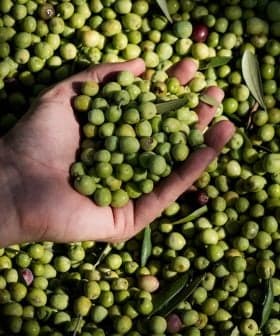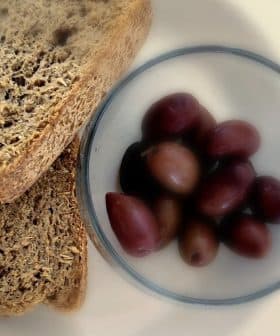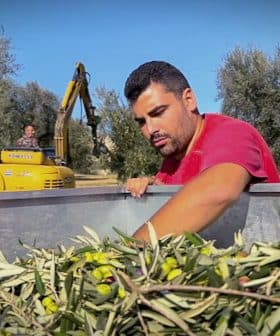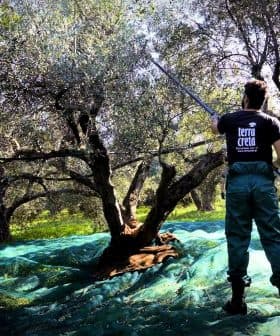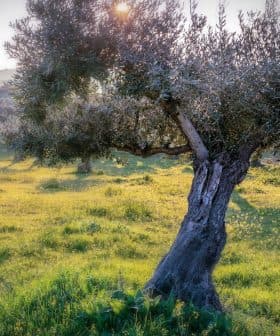Innovations, Discoveries and Breakthroughs in Ancient Olympia
The Oleocanthal International Society Conference and Olympia Health & Nutrition Awards featured breakthroughs in olive oil research, a new olive tree varietal, and an olive oil competition for high-phenolic oils.
 International Olympic Academy
International Olympic AcademyThe Oleocanthal International Society (OIS) held their third conference in Ancient Olympia, Greece, where researchers and olive oil producers discussed breakthroughs in olive oil research and the newly discovered Olympia varietal. The conference also featured the first Olympia Health & Nutrition Awards, recognizing olive oils with the highest phenolic content and promoting the health benefits of extra virgin olive oil.
The Oleocanthal International Society (OIS) recently gathered researchers and olive oil producers at the Olympic Academy in Ancient Olympia, Greece for the OIS’s third conference and the first Olympia Health & Nutrition Awards.
More than 400 participants exchanged information about breakthroughs in olive oil research, a newly discovered olive tree varietal and a completely new type of international olive oil competition.
The OIS aims to combine practical and clinical research to showcase the health benefits of extra virgin olive oil. At the conference, OIS founder and president José Amérigo discussed the progress made during the last three years in combining health issues and gastronomic concepts by studying oleocanthal and other related phenols found in extra virgin olive oil and the Mediterranean diet.
The conference was noteworthy for fostering a dialogue between scientists and olive oil producers so scientists could learn about problems to consider during future research, and producers could learn how and why to increase the health value of their EVOOs.
Prokopios Magiatis, vice-president of the OIS, presented the first Olympia Health & Nutrition Awards to distinguish oils with the highest content of phenolic compounds.
“This is a unique olive oil competition that relies mainly on the amount of specific health-protecting phenols” in the EVOO. Magiatis said he expected this to become an annual competition that “reveals the healthiest olive oils in the world.”
Eleni Melliou revealed that a new varietal of olive tree had been discovered in a mountainous area near Olympia. This varietal, including trees more than 1,500 years old, had been neglected and unnamed until Melliou proposed the name of the cultivar Olympia due to the location of its discovery.
The Olympia cultivar is noteworthy for producing a very pungent, bitter olive oil with three to five times more phenols than the international average, according to Magiatis.
Dan Flynn, executive director of the UC Davis Olive Center, gave a speech on the need for more imaginative marketing of oleocanthal-rich olive oil in order to capture a section of the lucrative functional food market in the United States, the world’s leading market in this field.
Mary Flynn, associate professor of medicine at Brown University, made some captivating claims in her talk: “Let food be thy medicine and let medicine be thy food,” arguing that “extra virgin olive oil is more medicine than food.”
Or it’s both: Flynn told Olive Oil Times thatextra virgin olive oil “is far and away the most fascinating food we have. There is no other food that can provide the range of health benefits — and makes food taste so much better.”
While oleocanthal has already been associated with the prevention of Alzheimer’s disease, inflammation and even cancer, a number of presenters provided specific information about oleocanthal’s potential health benefits.
For example, Amal Kaddoumi from the University of Louisiana at Monroe explained that the results of her research “support the beneficial and protective effect” of high-oleocanthalextra virgin olive oil against Alzheimer’s disease and cerebral amyloid angiopathy, a condition that can increase the risk of stroke and dementia.
John William Newman, a research chemist with the U.S. Department of Agriculture at the Western Human Nutrition Research Center in Davis, California, described clinical research on the effect of oleocanthal-rich olive oil on blood platelet aggregation.
Presented fully for the first time at this conference, the results suggest that oleocanthal-rich olive oil has an effect on blood platelet aggregation similar to ibuprofen in certain individuals, meaning potential protection from infarction and strokes.
Also involving University of Athens researchers, this was the first study of oleocanthal’s effect that directly involved human subjects, according to Magiatis.
As he explained to Olive Oil Times, “the same effect was not observed after consumption of olive oil generally rich in phenolics (e.g. free tyrosol but not oleocanthal). Specific health-protecting properties of olive oil are related to specific ingredients and are not generally observed for all types of olive oil. The results need verification in a larger population, but there is already a very strong indication” of a beneficial effect.
Ongoing research at the University of Athens was highlighted by several presentations of previously undisclosed new findings. For example, Annia Tsolakou reported that an average of 55 percent of oleocanthal can be preserved under normal storage conditions 12 months after bottling and 18 months after harvesting.
In this Olympic year, the OIS decided to bestow awards to recognize the olive oils that contain the highest phenolic content, as well as the most innovative olive mills, the individuals and companies that promote research and development, and those that create fine recipes using high oleocanthal olive oils.
Five hundred sixty-fiveextra virgin olive oil samples were submitted to the competition by 325 producers from Greece, Spain, Italy, USA, Cyprus, Morocco and Uruguay. Focusing on EVOOs without any obvious organoleptic defect, the best ones were selected based only on the oleocanthal content and the total phenols (tyrosol and hydroxytyrosol derivatives related to the European Union health claim regulation). The complete list of awards is available on the OIS conference website.
The highest oleocanthal olive oil was The Governor, produced by the Dafnis family and derived from the Lianolia olive tree, with 966 milligrams oleocanthal per kilogram. The highest in total phenolics, with 3,076 milligrams per kilogram, was the Drop of Life, which is derived from the newly discovered Olympia variety and produced by the Mathiopoulos family at The Greek Olive Estate.
According to Magiatis, “the Olympia Awards is a new type of competition, complementary to the awards based on sensory evaluations. Its main advantage is that the results are based on absolutely objective criteria and can be verified by anybody through a chemical analysis.”
“Some of the oils have also been awarded in sensory competitions,” she added. “Of course, some consumers are mainly concerned about the health properties and not the taste, and they can choose their oil based on the results of the Olympia competition.”
“However,” Magiatis continued, “an oil combining a high phenolic level and excellent organoleptic properties should become the future target of all high-quality producers.”
George Mathiopoulos of The Greek Olive Estate reminded Olive Oil Times readers that “Hippocrates referred to olive oil as ‘The Great Healer,’” adding, “we think this is an opportunity for Greek olive oil to shine.”
Spyros Dafnis of The Governor suggested that “the future belongs to the high-phenolic oils … a new category of olive oil which has now been born.”
Dafnis asserted that “now quality oil means oil without taste defects but mainlyextra virgin olive oil that benefits and protects human health.” He argued that “we need to elevate the production of olive oil to a science.”


